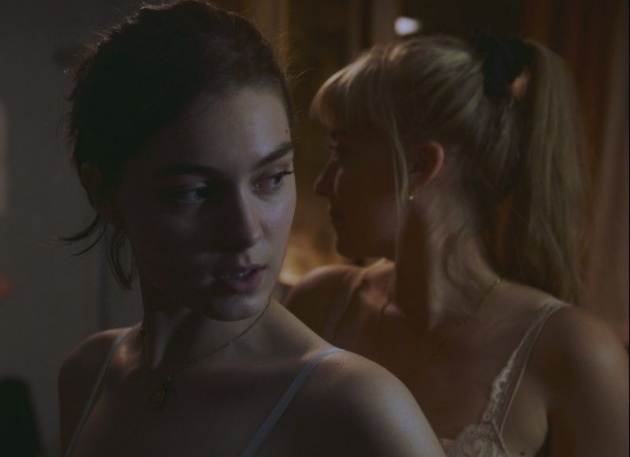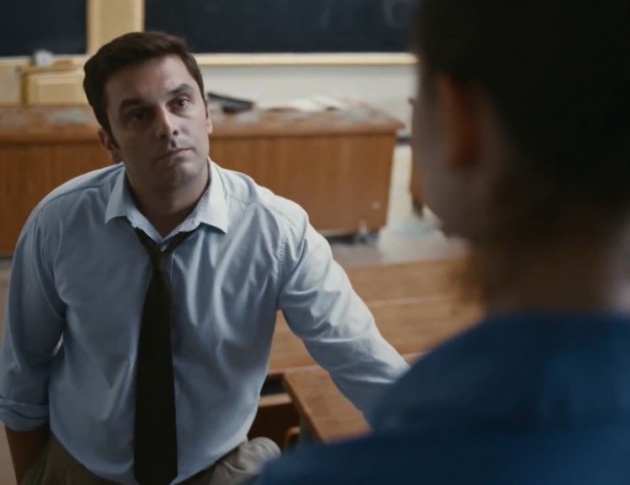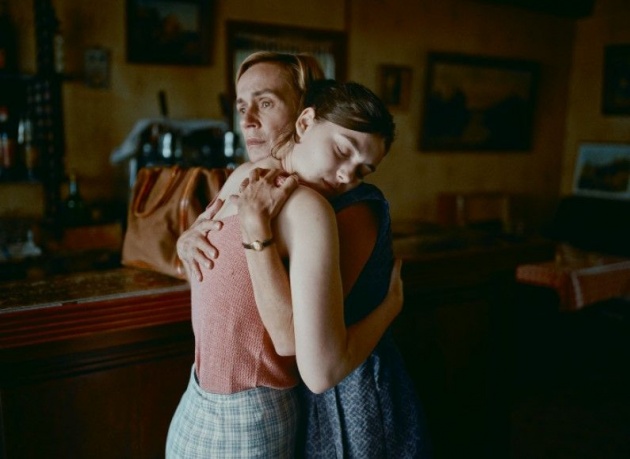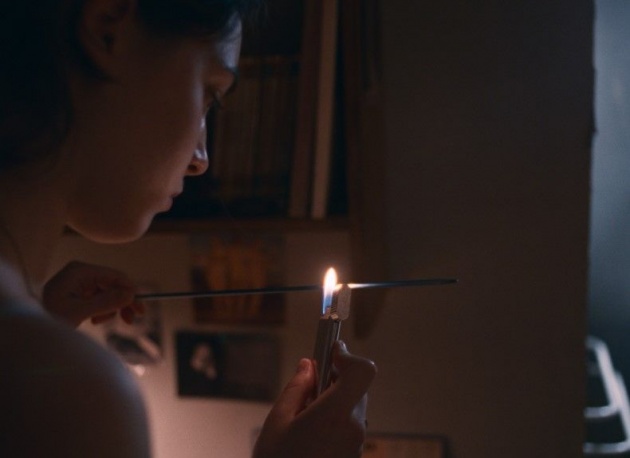
Pictured: Party time in an era when it was anything but. Anne (Anamaria Vartolomei) and Brigitte (Louise Orry-Diquéro) in a scene from the 1963-set French abortion drama, 'L'événement' ('Happening') directed by Audrey Diwan and adapted by Diwan and Marcia Romano from Annie Ernaux's novel. Still courtesy of IFC Films (US) / Picturehouse Entertainment (UK)
Audrey Diwan’s second film as director, L’événement (Happening) is a tightly controlled, grab and don't let go adaptation of Annie Ernaux’s 2000 novel. Diwan, who has worked on the screenplays for BAC Nord, HHhH and La French, directed by her former partner Cédric Jimenez, infuses the film with the accelerated heartbeat of a thriller. You utterly root for the protagonist, young student Anne Duchesne (newcomer Anamaria Vartolomei) as she seeks an abortion at a time (1960s France) when such acts were criminalised.
Abortion remains a controversial issue. Although today it is illegal in all forms only in twenty-four countries (source: World Population Review), in another thirty-seven countries it is permitted only if it saves a mother’s life. In the US, up to twenty-six states are seeking to outlaw abortion, with eight states having unenforced bans in their statute books. Abortion was only legalised in France in January 1975, when a woman who could request it before the tenth week of pregnancy. Pro-lifers continue to argue their case against pro-choice in spite of a lack of agreement of the age at which a foetus becomes a life (somewhere between nine and sixteen weeks).
L’événement, which Diwan co-scripted with Marcia Romano, doesn’t judge Anne for her one act of sexual behaviour. In the 1960s as of now, it is men who continue to pressure women into having sex. It begins with a black screen. We hear chatter of two girls, Anne and Brigitte (Louise Orry-Diquéro) as they help one another fasten their tightened brassieres. Diwan cuts from black to reveal the pair. They invite Hélène (Luàna Bajrami), who is standing by a wall looking on, to have her brassiere adjusted. She refuses. After a cut, Diwan’s camera follows the trio, now in their party dresses, as they approach a room where young people are dancing to rock-and-roll music. Anne doesn’t jive for very long after her friends tell her that someone is looking at her. He turns out to be a local fireman, masquerading as a student. Anne doesn’t speak to him for very long before sidling up to the bar and asking another student, Jean (Kacey Mottet Klein) to buy her a Cola, which he duly does. Anne wants to show the fireman that she’s not interested, but she isn’t interested in Jean either. We learn that there is a hierarchy. Firemen, by implication lacking higher education, are not for dating. Literature students, like Anne and her friends, are also considered ordinary. But Political Science students – wow! This, incidentally, is the subject Diwan herself studied.
In the privacy of her room, Anne checks her underwear. No sign of menstruation. She notes this in her diary. A caption appears: ‘3 semaine’ (third week) before a cut to black.
At a lecture, a female student, seen from a distance at the other side of the hall, struggles to interpret a section of poetry. Anne’s friends discuss the girl, who is apparently leaving, having gotten pregnant. The camera stays on Anne’s left, leaving the struggling student in long shot. Diwan keeps her camera close to her protagonist. There are very few shot-reverse-shots. Anne is often framed with others, sometimes on her own. The camera duplicates the scrutiny that Anne herself is under, appraised and criticised by others. It doesn’t represent the male gaze, eroticising Anne, rather the gaze of censure, the look that expects Anne to break down and confess everything. Diwan also employs the narrow 4:3 (or 1.37:1) Academy Ratio, limiting the size of the screen. The intention is to create a sense of entrapment, a limited space for movement. For the most part, the camera tilts down Anne’s body – most notably in one horrific scene towards the end - and pans away only briefly and furtively before returning to her, as if pulled back by an elastic band. The movement suggests the limitations of Anne’s world; she can’t venture far outside it.
In the lecture hall, Anne is asked to interpret the poetry and does so earning the lecturer’s praise. She draws attention to the use of anaphora, the repetition of a series of words in neighbouring lines. Anne is clearly gifted and clever. The lecturer (Pio Marmaï) considers her a future professor; we learn later than Anne is considering a career in education.

Pictured: Anne's literature professor (Pio Marmaï) expresses concern in a scene from the 1960s-set French abortion drama, 'L’événement' ('Happening'), directed by Audrey Diwan and adapted from the novel by Annie Ernaux. Still courtesy of IFC Films (US) / Picturehouse Entertainment (UK)
Anne sees a doctor, who tells her that she is pregnant. Anne asks for help. The word ‘abortion’ is never mentioned, but it is understood. The doctor replies, ‘you cannot ask me that’. By keeping the camera on the doctor, Diwan emphasises that this isn’t a dialogue of give and take, where Anne can influence his opinion. We see the doctor close himself off to her distress. The camera doesn’t show his gaze. Having diagnosed her condition, he has moved on. For her, and for us, he has confirmed the worst. In this scene, Anne gives her year of birth as 1940, the film being set some time in the late 1950s and early 1960s (the publicity for the film indicates that it is 1963). The exact age of the students is unclear; the only point of relevance is that they are sexually mature. The scene is also notable for Anne lying about having had sex, describing being pregnant as ‘impossible’. This is, of course, a figure of speech, Anne protecting the man involved.

Pictured: Anne (Anamaria Vartolomei) embraces her mother (Sandrine Bonnaire) in a scene from the French 1960s-set abortion drama, 'L’événement' ('Happening') adapted from Annie Ernaux's novel by director Audrey Diwan. Still courtesy of IFC Films (US) / Picturehouse Entertainment (UK)
We are introduced to Anne’s parents, who run a bar. Mother (Sandrine Bonnaire) is seen counting the takings that are kept in a cashbox. She hands Anne a note: ‘buy yourself a novel’. We are used to scenes like this that set up the protagonist stealing later on. To Diwan’s credit, we are wrong-footed, though there is a point in the drama when Anne requires 400 francs.
The weeks are counted with steady regularity as Anne consults another doctor and is given a prescription that costs 20 francs. We watch as she injects herself in the leg, having been promised that her menstrual cycle will resume. No such luck. We later find out she was prescribed a drug to strengthen the foetus. She tells her friends, who refuse to help her directly. In the shower, as the weeks tick on, the girls around her subject her to judgmental looks. They resent Anne because she is clever; one accuses Anne of having syphilis (‘look at you down there’). In one scene, we expect a fight, but Anne simply pushes her way past her tormentor. The shower scenes show that there is no escape, no way that she will be able to stop other students from noticing.
The idyll of three girls together - one giving Anne the gum that she was chewing on after she ran out, another demonstrating sex while straddling a pillow (‘it is important that you make this motion,’ she says, swivelling her hips), the trio reciting Latin together - is shattered. When Anne turns to a male student for help, he tries to have sex with her. Finally she calls Maxime (Julien Frison), the Political Science student who impregnated her. During a visit to the coast, Anne tells him that she is not keeping it. Maxime isn’t helpful or supportive. He just wants Anne to be charming and intelligent in front of his friends. She leaves without spending the full weekend with him. ‘How will get back?’ he asks. ‘I’ll manage,’ Anne replies. She hitches a lift. Fortunately, her driver isn’t presumptuous.
As her anxiety grows, her course work starts to suffer. The lecturer, who otherwise denigrates his students for their poor papers, doesn’t remark as he hands Anne’s work back to her but is clearly disappointed. ‘If you carry on, you won’t get into university,’ he tells her at the end of the lecture.
Anne even rows with her mother. ‘Why aren’t you studying?’ ‘I don’t feel like it.’ ‘What if instead of working in the bar, I went outside to tan my legs.’ ‘What do you know about studying?’ Anne asks. Her mother slaps her. At no point does Anne tell her parents that she is pregnant. At one point, she explains her position succinctly. ‘I want to have a child, but not at the expense of a life. I don’t want to resent it.’ This statement, simple and short, uttered late in the drama, needs no elaboration.
The threat of imprisonment is real. If an abortion takes place and is recognised as such, Anne will go to jail, as will anyone caught helping her. The best she can hope for is that the examining doctor describes the unborn foetus’ death as a miscarriage. Anne tries to terminate her pregnancy herself unsuccessfully with a thin warmed-up metal pole in one of a series of hard-to-watch sequences. She is eventually given a contact: Madame Riviere. ‘Tell her the girl from the paper sent you,’ she is advised. Hélène has something to tell her as well, that she had a relationship with a man for a month the previous summer. They had sex but fortunately she did not get pregnant.

Pictured: Anne (Anamaria Vartolomei) prepares to end her own pregnancy using a warmed up metal rod in a scene from the French abortion drama, 'L’événement' ('Happening') directed by Audrey Diwan and adapted by Diwan and Marcia Romano from the novel by Annie Ernaux. Still courtesy of IFC Films (US) / Picturehouse Entertainment (UK).
The nudity in the film is both natural and exacerbates our sense of discomfort. The film is unflinching in its depiction of the process of procuring an abortion and the steps taken to complete the process. As Madame Riviere (Anna Mouglalis) tells her, ‘If you make a sound, I’ll stop. The walls are paper thin,’ adding, ‘It will be painful. Think of something else.’ The procedure requires an implant of a rod and then an anxious wait.
At the end of the film, there is a postscript, 5 July. The lecturer recites a quotation from Victor Hugo, a call to arms of sorts. It is clear that Anne, the rulebreaker, who in the course of her struggle determined that (if she survived) she would be a writer, is the true revolutionary. Diwan’s film is firmly in favour of the revolution that followed a few years later (May 1968) and the legislative change that came seven years afterwards.
Reviewed at Cineworld West India Quay, Screen Eight, East London, Saturday 30 April 2022, 18:15 screening



